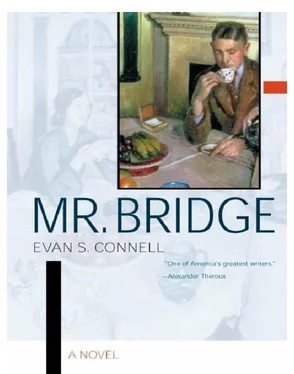He concealed his dismay at these Thursday suppers, and told himself it was not his wife’s fault if she no longer cooked as well as she did when they were first married; after all, cooking requires practice like everything else, and since Harriet had taken over the kitchen there was not much for Mrs. Bridge to do. Once she had been quite good, never in a league with Harriet, but there had been a time when she could make excellent little puddings and special kinds of bread to go with the fried chicken and the pot roast. She could bake an agreeable cherry pie, a rich banana upside-down cake, and crisp tarts, and she knew how to make chili without using too much tomato sauce. He had never been dissatisfied with her cooking — even now it was not bad — but on Thursday nights he could not overcome a sense of weariness as he plunged his fork into the casserole.
Each year on their anniversary they went out to dinner. He insisted on this because it was traditional, although he knew she would just as soon stay home. Sometimes they went to the Mission Country Club, sometimes they went downtown to one of the big hotels or to a restaurant they had heard about. One year they decided to try a supper club near the Warwick Theater which the Barrons had recommended, and they were not disappointed. The food was excellent, there was nothing wrong with the service, and the atmosphere was pleasant. After dinner they lingered awhile listening to the music and they got up several times to dance. Then it was time to go home so Mr. Bridge signaled for the check. It came to eleven dollars and twenty-five cents. He examined it to be sure they had not been overcharged and that the addition was correct. Then he laid three five-dollar bills on the tray. The waiter, bowing and smiling, inquired in a practiced murmur whether there would be anything else, and Mr. Bridge was astounded to realize that he meant to keep all of the money.
“You will bring me the change,” he said.
When the change was brought to him he counted it and found that it was correct. He put two dollars into his wallet, twenty-five cents went into his trousers pocket, and he left one dollar and fifty cents on the tray. Then he stood up, the waiter held the chair while Mrs. Bridge got to her feet, and they walked out.
As they were driving along Ward Parkway he considered what had happened. He was afraid his wife had been embarrassed.
He said, “Maybe I should have let that fellow get away with it. After all, another two dollars wouldn’t break me.”
She replied that she thought he had done exactly the right thing.
“I’ve had waiters pull that stunt on me before,” he said, to justify himself. “They take advantage of people every chance they get.”
She agreed, and told him about a very similar experience on the Plaza when she was having lunch with Grace Barron.
“My Lord,” he muttered, “that fellow was hoping for thirty per cent!”
“He did seem awfully pushy,” she remarked. “Next year we’d better try someplace else.”
According to the mileage on the speedometer it was time once again to have the Reo lubricated. The company recommended a lubrication every one thousand miles and he did not like to drive farther than this without having the job done. He suspected it was not necessary quite so often; however, he did not want to take a chance on damaging the motor. The company also recommended a change of oil every thousand miles and he had accepted this without thinking about it, but now the idea began to irritate him: very possibly the auto manufacturers and the petroleum industry were conspiring to sell the public more oil than the cars required. He decided there was no reason to change the oil each time the car was lubricated. As long as the filter was functioning the oil should be all right.
At the garage where he parked he looked around until he located the manager, whose name was Jerry Buckworth. He was wearing his usual blue smock with Jerry stitched in white script above the pocket, but Mr. Bridge addressed him formally because he was the manager.
“Good morning, Mr. Buckworth,” he said.
The manager took the cigar out of his mouth and replied, “Good morning, Mr. Bridge. What can we do for you?”
“I would like to have the Reo greased.”
“When will you need it?”
“Six would be soon enough. Don’t change the oil.”
“We’ll have her for you,” the manager said.
Mr. Bridge nodded and walked out of the garage.
That evening when he returned to pick up the car he was met by the manager, who explained apologetically that the oil had been changed.
“I told you not to,” said Mr. Bridge.
The manager explained that he had forgotten to tell the mechanic.
“Well,” Mr. Bridge said, “I am not going to pay for that oil.”
“What we can do is this,” the manager said, “we’ll let you have it at cost.”
Mr. Bridge shook his head. “I intend to pay for the lubrication, nothing more. This mistake is not my fault. I distinctly told you. I will not be charged for something I did not order. I have been parking here for six years and nothing of this sort has happened before. Why does it happen now?”
“It was our fault,” the manager said. “We’ll take care of it.”
And that was how it ended.
Whenever he went to the garage to pick up his car it was brought out of the stall by Lester. Lester did not depend on tips for a living. He got a salary, and few of the garage patrons tipped him, but Mr. Bridge always handed him fifty cents. Parking cars day after day was not much of a life, and not only was Lester colored, he was cross-eyed. Mr. Bridge knew nothing else about him, not even his last name, but he liked Lester and he was sure the garage attendant returned this feeling — which had nothing to do with the fifty cents a day. They could not become more friendly than they were, yet it was a satisfying relationship they had, and Mr. Bridge occasionally wondered if there was anything else he could do to make life a little easier for Lester.
One afternoon when he was met by a strange attendant and did not see his friend anywhere he was puzzled. He asked if Lester was sick. The new attendant replied that he had been hired just that morning and did not know.
Mr. Bridge pointed to the stall where his car was parked. “Get me the blue Reo,” he said. Then he walked to the cashier’s window, where he saw Mr. Buckworth discussing something with the cashier.
“I notice you have a new man,” he said. “What’s become of Lester?”
“Lester’s not with us any longer.”
“Now don’t tell me you fired him!”
The garage manager cleared his throat and looked at Mr. Bridge uneasily. “They tell us he cut somebody up last night. You know how they are when they get to drinking. Him and some other nigger got in a fight. We don’t know what about. We found out this noon after Lester didn’t show up for work. They got him in city jail.”
“Great God,” said Mr. Bridge softly.
“Too bad. Lester was a good worker. He was with us a long while. But I’ll see Bob takes care of you.”
On his way home Mr. Bridge tried to believe what he had been told, but not until he saw it in the evening Star , a small article on the fourth page, could he accept it. Lester’s full name was Lester Leroy Titus. He was forty-six years old. He lived in a hotel on Wabash and he was an ex-convict. He had served ten years in Leavenworth prison for armed robbery.
He pointed out the article to his wife and asked if she had seen it. She had not, but after reading it she said, “Honestly, there’s so much crime these days.”
Читать дальше












